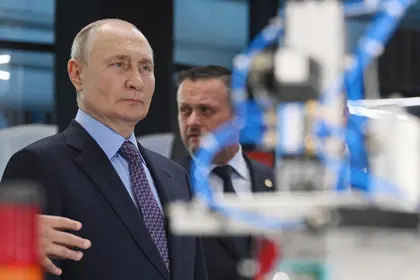During recent weeks, there has been an upsurge in Western and non-Western demand for a land-for-peace deal to end Russia’s war in Ukraine. For the sake of its own, and humankind’s, survival, so the story goes, Ukraine should forego some of its territory and/or sovereignty. Presumably, such a concession by Kyiv would provide an off-ramp for Russian President Vladimir Putin to end the Russian aggression.
The problem with this approach is not only that it involves counting chickens before they have hatched, i.e., by assuming Moscow will take up such an offer. The larger conundrum of such peace proposals is that Ukraine is – like Russia – part and parcel of the world’s political and legal order. It constitutes a full member of the international community of states and cannot be easily degraded with a land-for-peace-deal.
JOIN US ON TELEGRAM
Follow our coverage of the war on the @Kyivpost_official.
The Kremlin, of course, still provides putative explanations why Ukraine has no right to exist – at least, not in its current internationally recognized borders. Moscow continues its select presentation or plain falsification of this or that aspect of Ukrainian history, law, politics, culture etc. All of this is meant to substantiate the Kremlin’s claim that Ukraine is not really a thing.
The problem of this disinformation campaign is not so much its lack of factual accuracy and cherry-picking or decontextualization of certain past events. Moscow’s more fundamental challenge with its narrative on Ukraine is that rhetorically similar stories could be told about many countries. There are plenty of states, territories, and borders across the globe with confusing histories, contradictory tendencies, and odd episodes in the past or present. All countries of the world did once, like Ukraine, not exist.

Moldova Residents Caught in the Middle of Gas Fight
In spite of the explosiveness of Russia’s behavior for the international order, the Kremlin continues to insist that Pandora’s Box is empty. Even worse, Russia is not just any country in the post-Cold War world. It has inherited from the Soviet Union a permanent seat in the United Nations Security Council, and status as an official nuclear-weapon state under the Nuclear Non-Proliferation Treaty.
The Russian Federation is thus one of those five UN members which has special responsibility for upholding the order of nation states, world security system, and international law. With its actions, Moscow undermines the most fundamental principles of the UN Charter and is turning the logic of the non-proliferation regime on its head.
Potential consequences of such a truce arrangement
The various plans foresee a temporary or permanent limitation of Ukraine’s territorial integrity or/and political sovereignty. They create not only a problem for Ukraine, but a global issue. Implementation of such peace proposals would mean that the borders, freedom, and independence of a full UN member will be constrained not only by Russia, but also by other parties of such an agreement. After using large-scale military violence and nuclear blackmail, Russia would therefore be officially allowed by some multilateral group, to keep certain fruits of its aggression.
This would create a perverse incentive structure for future international relations. An internationally sanctioned land-for-peace deal could be seen as a model to be applied to conflicts between other UN members. Armed aggression, violation of borders, terror against civilians, and threatening one’s perceived enemies with employment of weapons of mass destruction, will eventually – such would be the message – be rewarded.
The slow and half-hearted reaction of the international community to Russia’s illegal annexation of Crimea in 2014, and hybrid war in the Donbas in 2014-2021 has already contributed to the subversion of the international security system. Partly, this damage has been repaired by more consistent Western reaction since the full-scale invasion began on Feb. 24, 2022. The implementation of a well-sounding peace plan would undo this positive effect on the international system. While it may temporarily end the fighting in Ukraine, it would deepen the cracks in the world order.
There is thus no common ground between Ukraine’s and the international community’s interest in upholding international law, on the one side, and Russia’s war aims, on the other.
Since the start of its invasion in 2014, Moscow has been trying to take full political control over Ukraine. The Kremlin has now been willing to pursue this war goal for more than nine years. To date, there have been no reasons to believe that Moscow will abandon its initial war aim, once the occasion arises again. A kind of Minsk III agreement would become a part of the problem, rather than its solution – as was the case with infamous Minsk I and Minsk II accords of 2014-15.
A land-for-peace or similar deal would mean that Russian might is acknowledged as right. This admission would derail not only the liberal order, but international security and stability in general. It would ridicule the world-wide regime for the non-proliferation of nuclear and other weapons of mass destruction. Key supporting pillars of the rules-based order of nations would be shaken. A questionable deal now may, moreover, mean only a temporary peace. The price of a short-term soothing would be a subversion of such basic principles of humanity as the inviolability of borders, sovereignty of states, and integrity of national territory.
Andreas Umland is an analyst at the Stockholm Center for Eastern European Studies (SCEEUS) at the Swedish Institute of International Affairs (UI). This article is based on a larger SCEEUS project on hindrances for a Russian-Ukrainian truce: https://sceeus.se/en/publications/ [sceeus.se].
The views expressed are the author’s and not necessarily of Kyiv Post.
You can also highlight the text and press Ctrl + Enter










